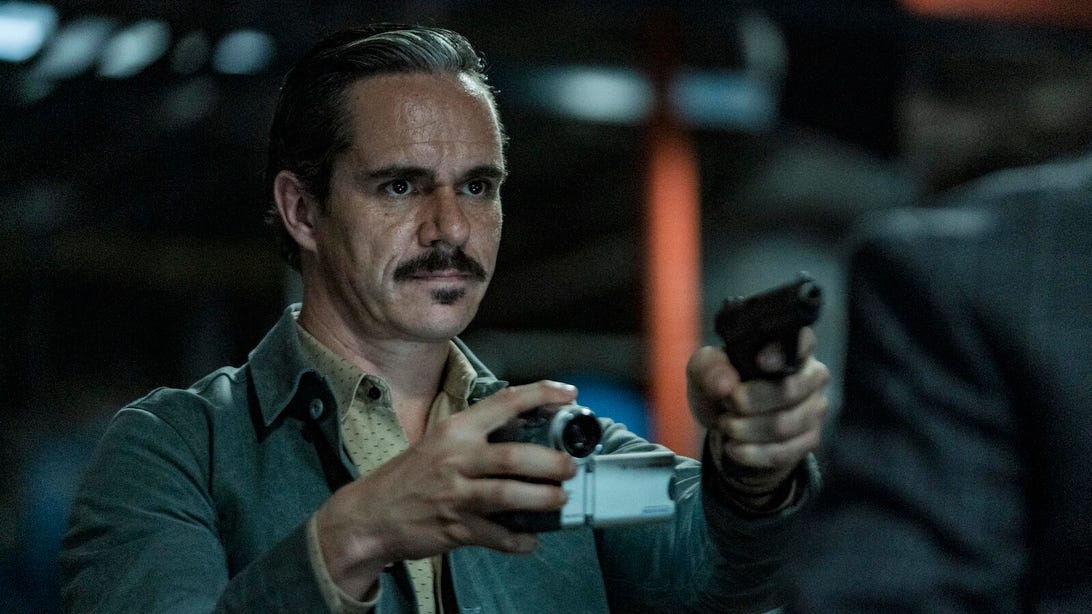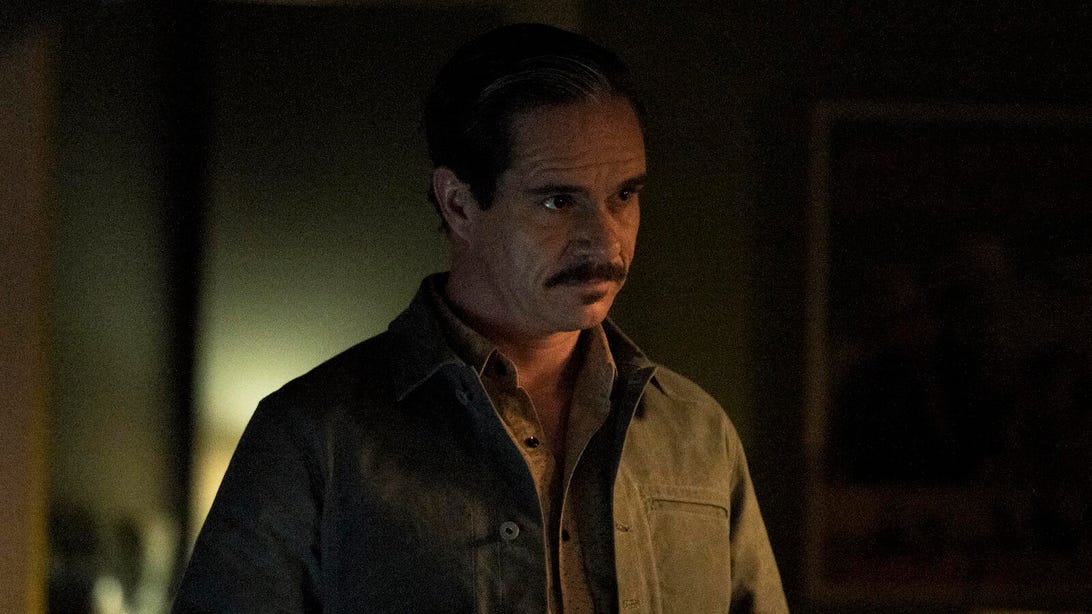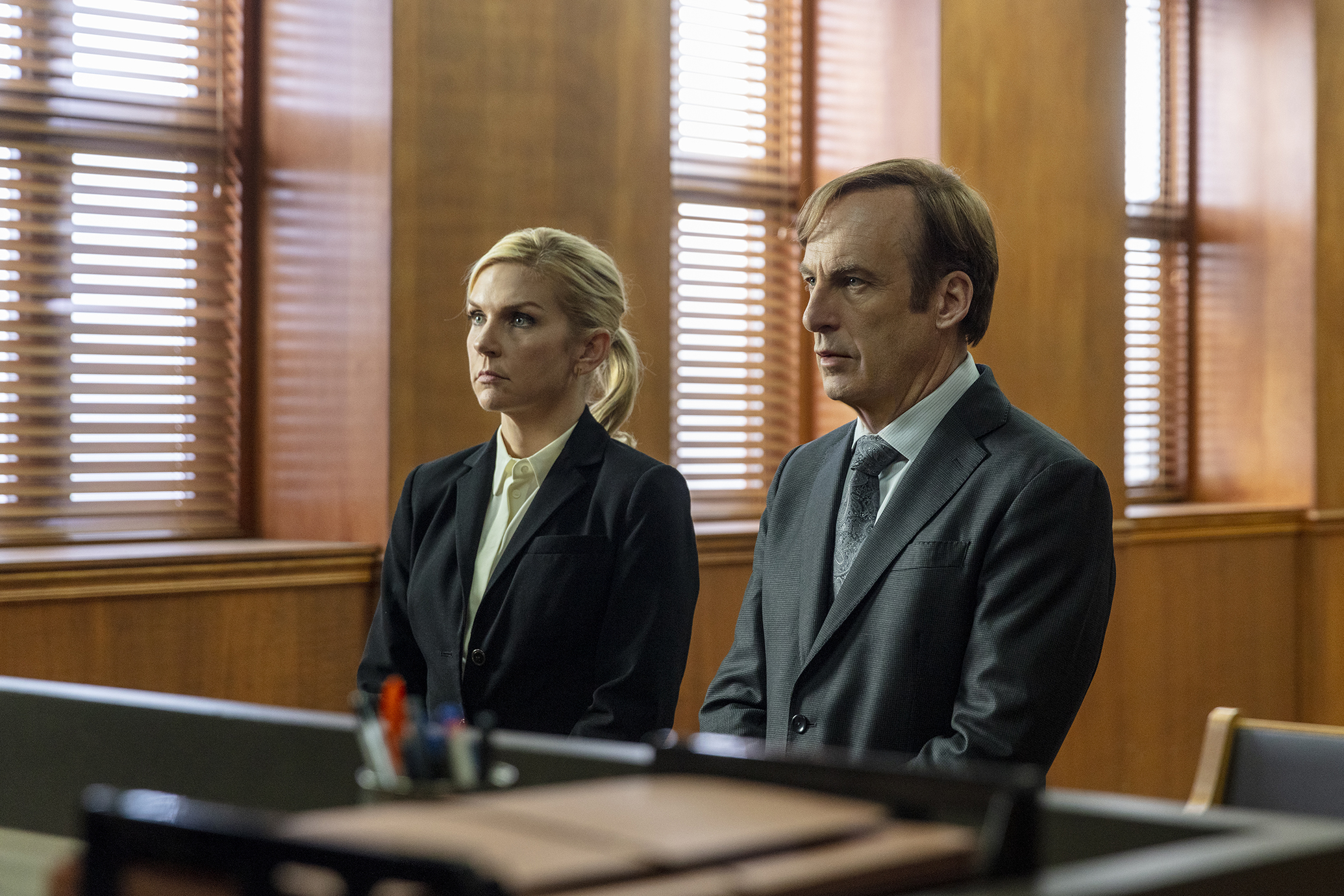Join or Sign In
Sign in to customize your TV listings
By joining TV Guide, you agree to our Terms of Use and acknowledge the data practices in our Privacy Policy.
Better Call Saul's Tony Dalton Breaks Down How Lalo's Ego Fueled That Bitter Twist
'Everything changes from now on'

Tony Dalton, Better Call Saul
Greg Lewis/AMC/Sony Pictures Television[Warning: The following contains major spoilers for Season 6, Episode 8 of Better Call Saul, "Point and Shoot." Read at your own risk!]
As any dedicated Better Call Saul fan knows, the entire existence of Lalo Salamanca (Tony Dalton) was born from a single, panicked line spoken by Saul Goodman (Bob Odenkirk) in Season 2 of Breaking Bad. After years of wondering what happened to make the lawyer formerly known as Jimmy McGill fear for his life at the mere suggestion of Lalo's presence, we finally got our answer in the show's Season 6 midseason finale, when Lalo unexpectedly appeared at Jimmy and Kim's (Rhea Seehorn) apartment and brutally murdered Howard Hamlin (Patrick Fabian) without a second thought. What Jimmy doesn't know, of course, is that "Point and Shoot," the eighth episode of the series' final season, confirms that Lalo will never call on him again, confined as he is to his final resting place under the infamous meth lab after being fatally shot by Gus (Giancarlo Esposito).
By the end of the Vince Gilligan-directed hour, we finally know what became of Lalo's elaborately orchestrated revenge plot against Gus. The cartel leader ropes Jimmy and Kim into his scheme and eventually breaks into the meth lab, where he kills the men Mike (Jonathan Banks) had ordered to protect Gus. And then it's just two guys and a video camera. Any viewer who's seen Breaking Bad knows this is not how Gus dies, but it's impossible not to feel riveted watching Lalo hold Gus at gunpoint as he malevolently delights in filming a tour of the lab for Don Eladio (Luis Politti). Ultimately, though, Lalo's planning didn't factor in his ego.
It's the hubris that gets Lalo killed in the end. Gus is able to distract Lalo with a biting monologue raging against Eladio, giving Gus a chance to disable the lights and reach for the gun he'd hidden in the lab episodes earlier. He shoots blindly into the dark and lands the final blow against the man who had him so terrified he was living in an underground bunker. In a pitch-perfect final move, Lalo leaves Gus with one last, haunting smile as he dies.
The last time we see Lalo, his body is being thrown into a deep grave under the lab, right alongside Howard's corpse. It's the kind of shot that can instantly alter the way you look back on Breaking Bad: an entire show built on top of the bodies of Lalo Salamanca and Howard Hamlin. You best start believing in ghost stories — you're watching one.
Going into these final episodes, Lalo's death has significantly altered the focus of the story. Dalton caught up with TV Guide to discuss shooting the death scene, how Lalo's last smile came to be, and the impact his character's fate has on Breaking Bad.

Tony Dalton, Better Call Saul
Greg Lewis/AMC/Sony Pictures TelevisionLalo's fate was a big question mark going into this season, and he's now the third major character to die in a very short period of time. What was your first reaction when you learned this is how Lalo would meet his end?
Tony Dalton: I got a call way before we started filming, from Vince and [showrunner Peter Gould] where they told me what episode I was gonna die. To be honest with you, I was actually kind of happy about it. You want to have a worthy death, especially if you're playing a villain. Even Gus's death in Breaking Bad is like, wow, you know? When they told me, I said, "Just tell me how I died." They wouldn't tell me, and then they said, "Well, you take a lot of motherf---ers down with you." I was like, "All right, that's good enough for me." You go down with a blaze of glory.
What was it like filming that shoot-out between Lalo and Gus?
Dalton: It was a weird day, because, you know, it's the day you die. So everybody's kind of quiet, everybody's very focused. Everybody's very somber, very respectful. There was a lot of blood going around, because I had all these hoses around my neck and everything. And Vince kept saying, "More blood, more blood!" And they'd squirt more blood. I was in this puddle in the lab, which was dirt, and that wasn't dirt anymore, it was mud. It was blood mud. Blood mud. It was disgusting, and it lasted forever and ever and ever. But it's bittersweet because you want to keep filming, but you're sticky and covered with blood the whole time.
Obviously we as the audience know Gus will make it out of this confrontation with Lalo, but I kept thinking that Lalo could've lived had he not enjoyed the theatrics of tormenting Gus by making him give the tour of the lab. Couldn't he have just killed him right away and been done with it?
Dalton: Yeah, I was thinking about that when we were doing it. Remember that movie, The Good, the Bad, and the Ugly? "If you're gonna talk, talk. If you're gonna shoot, shoot." But I think that that's actually what ended up killing Lalo, is his ego, his basking in the glory. He was just going to record the lab, and then Gus is there, and then he records Gus, and Gus says, "Wait, hold on a second, let me tell you what I think about Eladio." And [Lalo] goes, "This is perfect, man." And that was it. He shouldn't have let him do it.
I love the way Lalo laughs in Gus's face as he dies. It's so haunting. Tell me about what you make of that laugh.
Dalton: Yeah, it wasn't written that way. It was kind of like this quiet death. Then when we were doing it, I threw a little smile there, and then Vince goes, "That's it! But you know what? Smile at him like, 'I can't believe you got away with this.'" That's what we ended up doing. He's kind of looking at him like, "I'll see you in hell."
How many ways did you shoot it before you landed on the smile?
Dalton: Oh my god, how many ways did we shoot that thing? We were there all day long doing that. It was awesome that Vince got to direct it. Sort of like the best setup you can get. Those guys are like a finely tuned machine. Everything just starts aligning, and you get it, because you're in it, you're in the zone. "No, give me this, OK, now can you spit some blood out more? But do it at the end, and then just leave nothing in your eyes." We just kept doing it, and it kept getting better and better.

Tony Dalton and Giancarlo Esposito, Better Call Saul
Greg Lewis/AMC/Sony Pictures TelevisionLalo also brings up Nacho when he has Jimmy tied to the chair. You've said before that Lalo was just using Nacho, he didn't really have any feelings for him either way, but how does Lalo feel about him in those final moments? Is he at all hurt about finding out that Nacho was the one who set him up?
Dalton: I don't think so. I think that he's after Gus, he keeps his eye on the prize. I think his plan was, "After I kill Gus, then I'm gonna go look for that Nacho guy and kill him." He doesn't know he's dead. He's like, "I'll get to him. But let's not let's not lose focus here."
Revenge comes first.
Dalton: Correct.
I spoke to Patrick Fabian after Episode 7, and he talked about how the tragedy of Howard's death is that Lalo literally had no idea who he was. Now Howard is buried forever with the person who killed him, and Lalo is buried under this meth lab he spent so long trying to infiltrate. The entirety of Breaking Bad is literally built on top of those two. I know you can't tell me how that affects the final episodes, but I'm curious about what your perspective on that is, and if it changed your perception of Breaking Bad at all.
Dalton: Yeah, it's so weird to think that when I watched Breaking Bad 10 years ago, and you see the whole thing — even that episode where it's just about the fly, remember that one? It's like, yeah, they were just walking all over my grave. I was right there the whole time. It's so surreal to think that now I'm part of it where I wasn't before. I'm a part of it forever.
Did you and Patrick get to play your own corpses?
Dalton: Oh, yeah, we don't do corpse stunts. No corpse stunts. I mean, not when they threw us in the pit, obviously! I don't think there was even a stuntman to throw. But yeah, Patrick had a little more white makeup than I did, because he'd been dead a couple hours before I had. It was a weird day, we were having some coffee and he had a gunshot in his head and I was bleeding from the neck. It was like, "Hey, let's go get an espresso," you know? And it was like, "You guys can't be walking around the studio like that, because people can take pictures."
Speaking of Patrick, Lalo was off on his own for much of the first half of the season. How was it getting to shoot your final scenes with him, Bob, Rhea, and Giancarlo?
Dalton: It was very emotional. I didn't think it was going to get to me, but I ended up getting a little teary eyed when they all had a send-off. Everybody showed up that day, people who didn't have to go to work that day went. They all said some really nice things. It was very kind of them to say all that because I'm just grabbing on the coattails here. I'm only in the last two seasons, I'm just standing on their shoulders. These guys were the ones who made this whole thing happen. So for them to be so nice and kind and make me feel so special for the whole show, it was very emotional.
Speaking about Lalo being off doing his own thing, earlier this season we saw him fake romancing a widow, we saw him cut a guy's leg off, we saw him in the sewer. He was in a lot of really extreme scenarios. Which of those was your favorite to shoot?
Dalton: Oh man, don't ask me that! Look, honestly, the part where I show up at the apartment and I go, "Let's talk," and I shoot Howard in the head. That was so weird. Just being on the set with Patrick and with Bob and with Rhea at the same time, the four of us, you don't get you don't get to work with these guys very often. Lalo was kind of on his own, and he was doing his own thing. I got to work with Mike Mando a lot, which was amazing, but not with these guys so much. Everything changes from now on after that.
Do you have any final thoughts on Lalo's story? What has his journey meant to you?
Dalton: This career is so weird, you just never know what's going to happen. Then all of a sudden, I do a casting and I end up working with these guys, and the show ends up being what it is, and the character ends up being what it is, and everybody's so excited about it. It's just so fulfilling. You could be doing a show that nobody gives a sh-- about and the character sucks, you know? It could have gone that way very easily. I'm very thankful for it. I mean, I could retire right now. I'm done. My final answer is, I'm done with acting. Lalo's dead, Tony's gonna go live on some island somewhere.
Better Call Saul airs Mondays at 9/8c on AMC.

